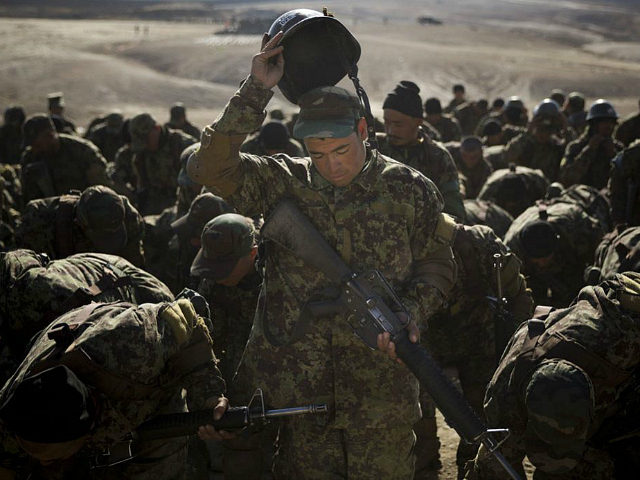U.S. Special Inspector General for Afghanistan Reconstruction (SIGAR) John Sopko accused top U.S. military officials in an interview on Thursday of knowing “how bad the Afghan military was” but keeping problems hidden, leading to shockingly swift battlefield gains by the Taliban insurgency after American troops withdrew.
“We exaggerated, overexaggerated. Our generals did. Our ambassadors did. All of our officials did, to go to Congress and the American people about ‘We’re just turning the corner,’” Sopko told Voice of America News (VOA), which attended his conference with the Defense Writers Group.
“Every time we had a problem with the Afghan military, we changed the goalposts. The U.S. military changed the goalposts and made it easier to show success. And then, finally, when they couldn’t even do that, they classified the assessment tool,” Sopko said.
Sopko accused “four-star generals, four-star military,” and “four-star ambassadors” of fudging reports and pushing agencies like USAID to “show success in short timelines, which they themselves knew were never going to work.”
“These short timelines, which have no basis in reality except the political reality of the appropriations cycle or whatever, whatever is popular at the moment, are dooming us to failure,” he said, indicating the problem extends beyond Afghanistan to other interventions and deployments.
Sopko denounced the “hubris that we can somehow take a country that was desolate in 2001 and turn it into little Norway,” and the “mendacity” of officials who perpetually overstated their success, making the Afghan government appear far stronger than it actually was when American and NATO troops began pulling out of the country.
Sopko’s office released its 52nd quarterly report to Congress on Thursday, a sobering metric of just how long U.S. troops have been in Afghanistan.
“The news coming out of Afghanistan this quarter has been bleak,” the report noted, describing a lightning Taliban offensive whose success made the Afghan National Defense and Security Forces (ANDSF) appear “surprised and unready.”
“The overall trend is clearly unfavorable to the Afghan government, which could face an existential crisis if it isn’t addressed and reversed,” SIGAR warned.
The report blamed a “pervasiveness of overoptimism” in U.S. policy culture that celebrated individual initiatives for supposedly hitting goals and timetables, with a tendency to “elevate good news and anecdotes over data suggesting a lack of progress,” and did not honestly assess the real strength of the Afghan government and military.
SIGAR said the results may have ruined the chances for any sort of peaceful settlement to the Afghan conflict because its early successes against the shockingly hapless ANDSF led the Taliban to think it can “achieve military victory” now that foreign forces have withdrawn.
The report noted that every indicator of distress and dysfunction in Afghanistan has grown swiftly worse, including skyrocketing coronavirus infection rates, deteriorating health resources for Afghan civilians, a surge of production for the notorious opium poppy industry, and an increase of almost 100 percent in the number of Afghans requiring humanitarian assistance over the past year. Almost half of the population now requires some form of humanitarian aid.
SIGAR added that the U.S. troop withdrawal has made its own mission in Afghanistan more “challenging” given the “growing insurgent pressure on the Afghan government.”

COMMENTS
Please let us know if you're having issues with commenting.